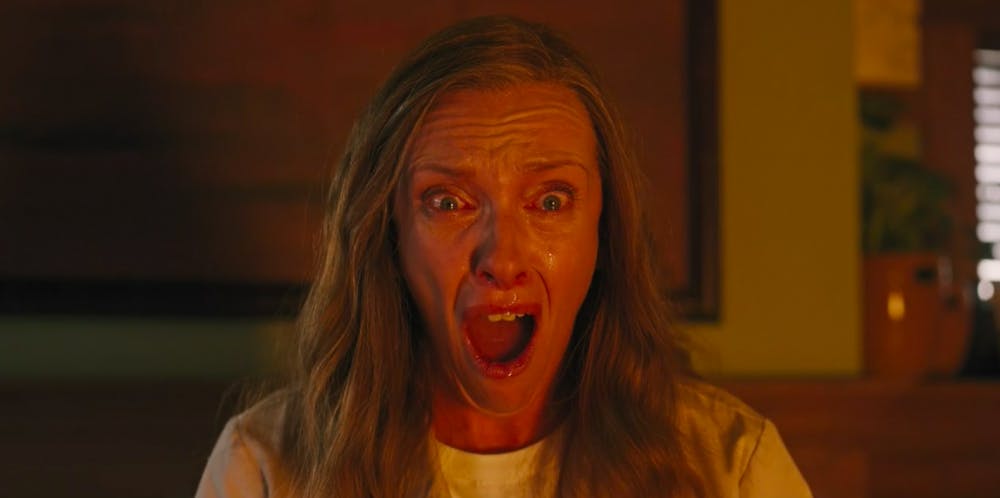RATING: 9.5 (good luck sleeping)/10
A24 has long been heralded as one of the purveyors of cult classic coming-of-age films; whether it’s twinkling with Greta Gerwig’s Lady Bird, Bo Burnham’s Eighth Grade, or even preparing to garner enormous praise from 90’s babies with Jonah Hill’s Mid90s. The production company’s modem for producing indie-saturated films doesn’t just extend to stories of perseverance in the face of high school. The bone-chilling storytelling of horror films The Witch and It Comes At Night also prove A24’s talent for injecting their audience with sharp dread, and with the latest edition of Hereditary to their horror lineup, audiences watching through their hands in the theater seems to be a constant occurrence.
The long and short of it? In terms of instant bowel relief, Hereditary is like thirteen levels above MiraLax.
Spoilers ahead!
The film’s opening starts off with an introduction to the Graham family, a nuclear unit of father Steve (Gabriel Byrne), stoner son Peter (Alex Wolff), eclectic daughter Charlie (Milly Shapiro) and main character and mother Annie (Toni Collette). The death of Annie’s mother Leigh is a fresh effect on the Grahams, but doesn’t truly seem to hold any weight on them save for Charlie, who despairs at the fact that her grandmother has perished and the fact that she wanted Charlie to “be a boy”.
Shapiro’s performance as Charlie can’t be said as anything other than masterful and fully immersive. Charlie’s complex intricacies and odd but endearing habits really reach out to the watcher and invite them to place her in their own lives, so when Charlie’s violent and sacrificial lamb-like death occurs, the trauma truly sticks and both validates and enflames the audience’s sense of uneasiness. The body horror that accompanies the brutal scene (not to mention Colin Stetson’s piquing and disturbingly discordant score) further burns more images into your mind (if you’re not a fan of ants, don’t see this, or at least get someone to tell you when to cover your eyes because it’s excellent).
The sense of building dread comes to a head as the viewer begins to start picking up the pieces at the same time as the family. This isn’t your slasher genre; there’s no masked assailant that you can see while the final girl’s desperately cowering under her bed. You’re just as desperate for answers as the family, slowly being prepared for their slaughter by the people who’ve wormed their way into their lives.
Peter, on the other hand, is brought to life by Alex Wolff (there’s no way you can tell people this without hearing about The Naked Brothers Band. Believe me). Peter’s the typical teen who’s more into weed and getting laid than pretty much anything else, and after the death of his sister, he clashes head-to-head with his mother on more than one occasion. Neither has the other’s best intentions in mind (“Why was she at the party, Mom?”), and Annie’s frantic summoning of spirits into her home to reincarnate Charlie, combined with the supernatural grooming Peter’s experiencing, make for an utterly unfortunate clash.
Annie Graham, the tortured artist and newfound matriarch of the family is embodied by the extraordinarily talented Toni Colette. As someone who’d experienced unimaginable trauma in her childhood, Annie’s expecting the death of her mother to be the end of a chapter of years of suffering and sacrifice, when really it’s anything but, and she’ll pay the ultimate price to the supernatural force.
Colette’s performance is both agonizing and fascinating to watch; there’s no disconnect or moment that the viewer feels like they’ve been cheated out of true acting. From the death of her mother to her daughter, to any others close to her, Colette puts her all into truly embodying someone both obviously distraught by grief and desperately seeking to grip onto something to give her relief. She goes through grief counseling multiple times, and her work on miniatures obviously represents a massive portion of her grieving process (complete with dioramas of both her mother and daughter’s deaths).
On another leg of the film, female suffering seems to be both pervasive and intricate. The perishing of every female family member in the movie only for the “greater good” of the crowning of an average teenage boy represents the thin veil of modern America through the lens of King Paimon, relentlessly shuttering complex and rightfully rageful women away in order to glorify male figures that don’t truly seem to deserve it.
The women in Hereditary don’t fall into the stereotypical and oppressive horror movie tropes of whining, nitpicking adults and rebellious children; they can be influential or evil or absolutely furious. They’re manipulative and powerfully cunning, like Ann Dowd’s Joan or Annie’s mother, or electrifyingly creative in their own ways like Charlie and Annie, but none are copies of another and distinctly and clearly stand out.
All in all, Hereditary’s power at both the box office and with critics has proven to be larger than life (generating over $70 million with a $10 million budget), and Wolff, Shapiro and especially Colette prove that their acting skills are not only demonstrably eloquent and jarring but versatile, utterly believable and human. They’ve defeated the long-standing trope of not caring about characters in horrors or thrillers due to lack of character development; in Hereditary you’re rooting for the Grahams for the whole two hours and seven minutes the film runs. They seem familiar and familial all at once, and the trauma and shared grief can easily translate from the screen into the viewer’s lives. Ari Aster’s compelling and dynamic horror debut represents the struggle and amplification of human emotion at their worst, leaving no survivors in his film’s wake.





